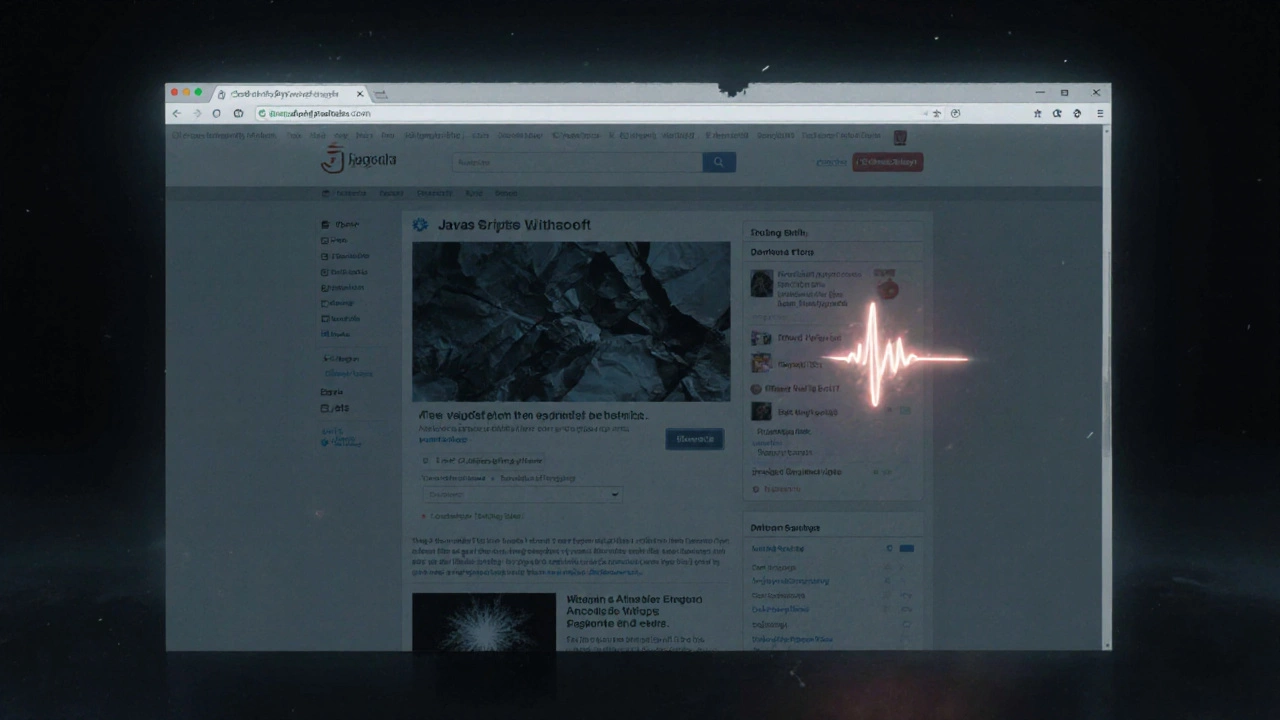JavaScript Career Earnings Calculator
See Your Potential Earnings
Based on 2024 industry data from U.S. Bureau of Labor Statistics and job market reports
Your Estimated Salary
Based on your skill level and location
Every new developer asks this question: Is JavaScript worth learning in 2024? The answer isn’t a simple yes or no-it’s deeper than that. If you’re sitting at your desk wondering if you’re wasting your time on JavaScript, let’s cut through the noise. You’re not just learning a language. You’re learning the operating system of the web.
JavaScript runs nearly every website you use
Open any website-Amazon, Netflix, your bank’s portal, even this one. Now turn off JavaScript in your browser. What happens? Most of it breaks. Buttons don’t work. Forms won’t submit. Videos won’t play. That’s because JavaScript isn’t just a feature-it’s the engine. In 2024, over 98% of websites use JavaScript. That’s not a trend. That’s the baseline.
It’s not just about static pages anymore. Modern web apps like Gmail, Trello, and Notion are built with JavaScript frameworks like React, Angular, and Vue. These aren’t optional add-ons. They’re the reason those apps feel fast, responsive, and alive. Without JavaScript, the web would still be a collection of clickable PDFs.
It’s not just for browsers anymore
Back in 2010, JavaScript was stuck in the browser. Today, it runs on servers, mobile apps, smart TVs, and even IoT devices. Node.js turned JavaScript into a full-stack language. Now you can write the frontend and backend in the same language. That’s a huge time-saver. Companies like PayPal and LinkedIn switched to Node.js and cut their development time in half.
Want to build mobile apps? React Native lets you write apps for iOS and Android using JavaScript. Want to make desktop apps? Electron powers Slack, Discord, and VS Code. Even Raspberry Pi projects use JavaScript. It’s the only language that works from your phone to your fridge.
Job demand hasn’t slowed down
Look at job boards. In 2024, JavaScript remains the most requested skill on LinkedIn, Indeed, and Glassdoor. More than 70% of frontend developer roles require React or Vue. Backend roles using Node.js are growing too. The U.S. Bureau of Labor Statistics predicts 25% growth in software development jobs by 2032-and JavaScript is at the center of that.
Junior developers with JavaScript skills are getting hired faster than ever. Companies don’t just want people who know HTML and CSS. They want people who can make things interactive, dynamic, and scalable. A resume with JavaScript on it gets 3x more interviews than one without.

The learning curve is smoother than ever
JavaScript used to be messy. Callback hell. Global variables. Browser inconsistencies. Today? It’s clean. Modern JavaScript (ES2023) has arrow functions, async/await, modules, and destructuring. It’s readable. It’s predictable.
Tools like VS Code, npm, and browser DevTools make debugging easier than ever. Free resources like freeCodeCamp, MDN Web Docs, and The Odin Project give you a clear path from zero to job-ready. You don’t need a computer science degree. You just need consistent practice.
And if you get stuck? Stack Overflow has over 2 million JavaScript questions. There’s a solution for almost every problem you’ll face.
It’s the gateway to higher-paying roles
Learning JavaScript opens doors to more than just frontend jobs. Once you know JavaScript, you can move into:
- Full-stack development (Node.js + React)
- Web3 and blockchain apps (using JavaScript libraries like ethers.js)
- Game development (with Phaser or Three.js)
- Automation and scripting (using Node.js to automate tasks)
- AI-powered web tools (TensorFlow.js runs machine learning right in the browser)
Salaries reflect this flexibility. A junior JavaScript developer in the U.S. earns an average of $75,000. With React and Node.js skills, that jumps to $95,000+. In Europe and Canada, the numbers are similar. You’re not just learning a language-you’re unlocking a career path with multiple exits.
What JavaScript won’t do for you
Let’s be honest. JavaScript isn’t magic. If you think learning it will make you a developer overnight, you’re wrong. It takes time. You’ll hit walls. You’ll spend hours fixing a single bug. That’s normal.
JavaScript also won’t replace other skills. You still need to understand HTML and CSS. You still need to learn how to debug, how to structure code, how to work with APIs. JavaScript is the tool. The thinking behind it? That’s the real skill.
And if you’re aiming for high-performance computing, data science, or embedded systems? JavaScript isn’t the best fit. Python or Rust are better there. But if your goal is to build things people use every day? JavaScript is your best bet.
What happens if you don’t learn it?
Here’s the hard truth: if you avoid JavaScript in 2024, you’re choosing to work on the edges of web development. You’ll be stuck building static websites. You’ll miss out on the majority of freelance gigs. You won’t qualify for 80% of entry-level jobs.
Companies aren’t hiring people who can only make pretty pages. They’re hiring people who can make pages that respond, adapt, and scale. If you don’t know JavaScript, you’re not just behind-you’re invisible in the job market.
Where to start
You don’t need to learn everything at once. Start here:
- Master the basics: variables, functions, loops, conditionals
- Learn how to manipulate the DOM
- Understand events and event listeners
- Build a small project: a to-do list, a weather app, a quiz
- Move to a framework: React is the most popular
- Learn how to fetch data from APIs
- Deploy your project on Netlify or Vercel
That’s it. No certifications. No expensive courses. Just code. Build something every day-even if it’s small. In three months, you’ll be ahead of 90% of people who said they’d "start learning soon."
Final answer: Yes, but only if you’re willing to build
Is JavaScript worth learning in 2024? Absolutely. But not because it’s trendy. Not because everyone says so. Because it’s the only language that lets you build real, working, living web applications-from the browser to the server.
It’s not about memorizing syntax. It’s about solving problems. If you enjoy making things that people use, JavaScript gives you the power to do it. And in 2024, that’s more valuable than ever.
Do I need to learn JavaScript if I want to be a frontend developer?
Yes. Frontend development without JavaScript is like cooking without heat. You can arrange ingredients, but nothing happens. JavaScript is what makes buttons clickable, forms validate, and pages update without reloading. Every major frontend job listing requires JavaScript-and usually React or Vue. Skipping it means you’re not qualified for real frontend roles.
Can I skip JavaScript and just use WordPress or Wix?
You can build simple sites with WordPress or Wix, but you’ll hit limits fast. Want to add custom animations? Handle complex forms? Integrate with third-party tools? Those require JavaScript. Clients who need custom features won’t hire someone who only uses drag-and-drop builders. Learning JavaScript gives you control. Without it, you’re stuck as a template changer, not a developer.
Is JavaScript too hard for beginners?
It’s not harder than Python or Java-it’s just different. The biggest hurdle isn’t syntax. It’s understanding how the browser works. Start small: make a button that changes color when clicked. Then add a timer. Then fetch weather data. Each step builds confidence. Most beginners quit because they try to build an app before they understand variables. Take it slow. Practice daily. You’ll get there.
What if I only want to work in backend development?
Even backend developers need to understand JavaScript. Node.js powers most modern backend systems. You’ll need to write APIs that frontend teams consume. You’ll need to debug issues that happen between the client and server. Knowing JavaScript helps you communicate better with your team and solve problems faster. You don’t need to be a React expert-but you should know how to write clean, efficient Node.js code.
Will AI replace JavaScript developers?
AI can write basic code, but it can’t replace problem-solving. AI doesn’t know why a button isn’t working on Safari. It doesn’t understand user behavior or business goals. Developers who use AI as a tool-like using a calculator-are more valuable than ever. Learning JavaScript lets you guide AI, not be replaced by it. The future belongs to those who can think, not just copy-paste.
How long does it take to get hired with JavaScript skills?
With consistent effort, 3 to 6 months. That’s not a guarantee-it’s a realistic timeline. Spend 1 hour a day coding. Build 3 projects. Learn how to deploy them. Apply to junior roles. Most people who get hired didn’t wait until they "knew everything." They started applying after they could build something real. Your portfolio matters more than your resume.
If you’re serious about a career in tech, JavaScript is your entry ticket. It’s not the only skill you’ll need-but it’s the one that opens every door. Start today. Build something. Keep going.





